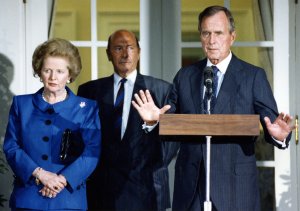Howard Dicus: A million soldiers converged in the Persian Gulf region in 1990 and began training for war.
Speaker: This is a drill, this is a drill, (inaudible) man your battle station.
Howard Dicus: Half the forces deployed in the Gulf only drilled, but the other side had actually fought. On the first day of August, Iraq invaded Kuwait.
Speaker: A major invasion by Iraqi troops deep inside Kuwait. Fighting is going on at this moment and there's lots of causalities.
Howard Dicus: That Kuwaiti diplomat called on the world to help. The Iraqi ambassador to the UN called on the world to bud out.
Speaker: The event currently occurring in Kuwait are an internal affair.
Howard Dicus: President Bush, the NATO allies and most Arab States close to the action saw the invasion by Iraq as the first test of the new post cold war era. Bush said, Iraqi leader Saddam Hussain had to be stopped, or other strong men might wage regional wars of their own, and so --
George H. W. Bush: At my directions, elements of the 82nd airborne division as well as key units of the United States Air Force are arriving today to take up defensive positions in Saudi Arabia.
Howard Dicus: The US moved a massive war machine to the region. Pilots flew big choppers and bigger cargo planes to the Saudi desert with soldiers, firepower, and gas masks.
Speaker: What I saw there was grenade launchers and M16, just basic fighting goods. They now had chemical warfare gear with them.
Howard Dicus: Saddam reacted by kidnapping foreign nationals by the thousands to hold as hostages. Guests, he called them. A few were lucky enough to escape. Jimmy Hawkins masqueraded as an Arab and escaped through Iraq.
Jimmy Hawkins: I have been in the desert about 10 or 12 kilometers.
Howard Dicus: Were you alone?
Jimmy Hawkins: In the desert? Yes. Fortunately I had some black clothes and I took off the Arab clothes which were white, and put on the black clothes to go at night.
Howard Dicus: The UN ordered Saddam to free all hostages and withdraw totally from the nation he overrode. Saddam did gradually free his hostages, but his soldiers stayed. While US and another soldiers on the other side grew ever more tensed.
Unknown Speaker: I hadn't really thought about it a whole life. I got a little spooked yesterday when I was thinking about it. I am here, I got to do it. It's just another part of the job.
Howard Dicus: The stress level was also high for the Commander-in-Chief.
George H.W. Bush: I am going to read my mail. It is so heart moving, supportive, and yet, please bring my kid home. Please, bring my husband home. And it's a tough question, but the President has to make the right decision.
Howard Dicus: When Saddam showed no sign of pulling back, the UN security council voted to give him a January 15th deadline. Secretary of State Baker presided.
James Baker: “Twelve votes in favor, two votes against, one abstention, the draft to resolution has been adopted.”
Howard Dicus: Still more, Western and Arab forces arrived on the scene as the year drew to a close. They drilled in tanks and jeeps, and accidents claimed dozens of lives. There were numerous attempts of negotiations, but meeting were canceled. As 1990 wound down, war pressures were winding up.
George H. W. Bush: “I'm not optimistic. I see no evidence that Saddam Hussain is ready to comply fully without condition with the UN resolutions.”
Howard Dicus: 1990 wasn't supposed to be like this.
Speaker: 1990, can and should, bring us closer to a period of genuine peace in World History.











